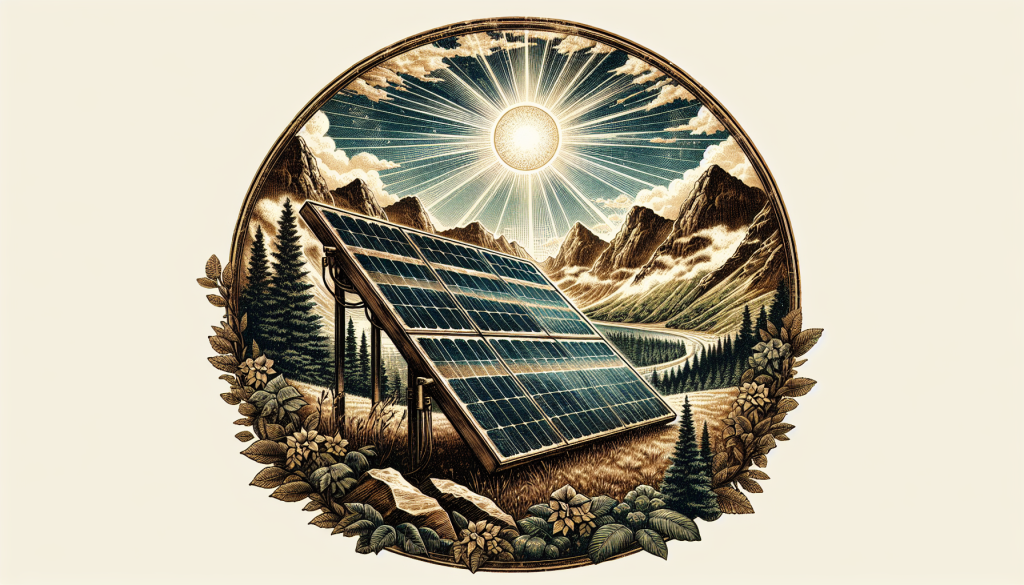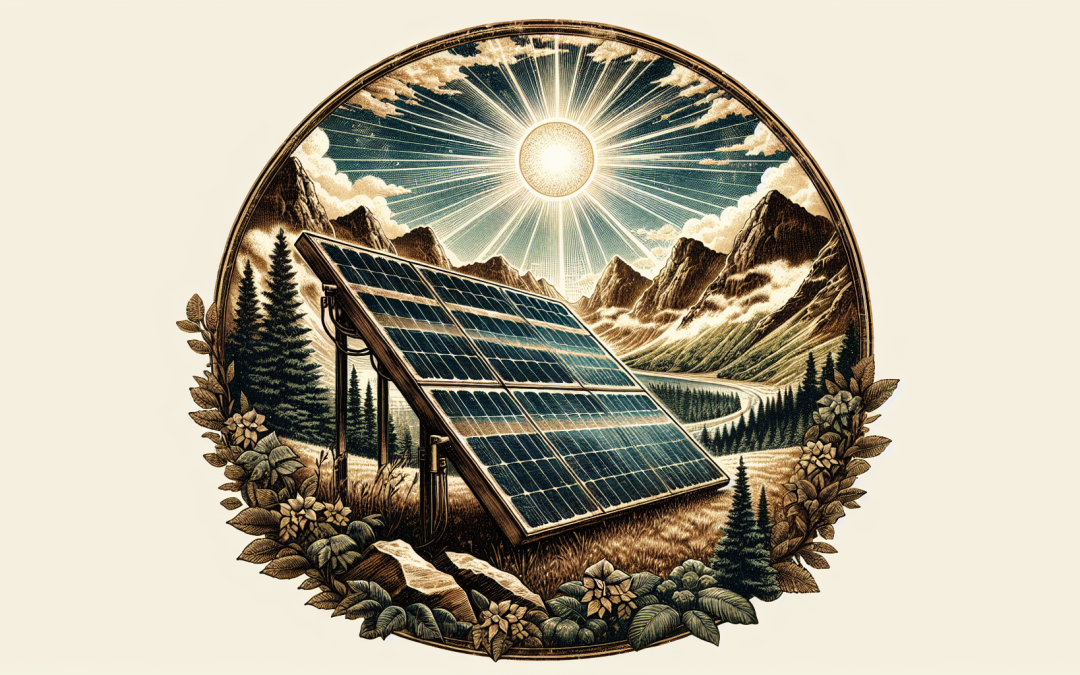Are you curious about how long solar panels can last? Well, you’re in luck! In this article, we will explore the topic of solar panel lifespan and provide you with all the information you need. From the latest technologies to maintenance tips, we’ve got you covered. So, if you’re ready to learn more about this renewable energy source and how it can benefit you for years to come, let’s get started!
Factors affecting solar panel lifespan
Solar panels are a long-term investment that can provide renewable energy for many years. However, their lifespan can be influenced by several factors that should be taken into consideration when installing and maintaining them. By understanding these factors, you can help extend the lifespan of your solar panels and maximize the benefits they provide.

Quality and manufacturing
The quality and manufacturing process of solar panels play a key role in determining their lifespan. There are various factors to consider within this category.
Types of solar panels
Different types of solar panels have varying lifespans. For example, monocrystalline panels tend to have a longer lifespan compared to polycrystalline or thin-film panels. It is important to choose the type of panels that best suits your needs and offers a higher lifespan.
Components and materials
The quality of the components and materials used in the manufacturing of solar panels can significantly impact their lifespan. Higher quality materials are generally more durable and resilient to environmental conditions. It is advisable to invest in panels that are made with high-quality materials to ensure a longer lifespan.
Manufacturer’s reputation
The reputation of the solar panel manufacturer is an important factor to consider when assessing the lifespan of the panels. Manufacturers with a proven track record of producing reliable and long-lasting panels are often a safer choice. Researching and selecting reputable manufacturers can help ensure the longevity of your solar panels.
Certifications and warranties
Certifications and warranties provided by manufacturers can serve as an indicator of the quality and potential lifespan of the solar panels. Look for certifications such as IEC (International Electrotechnical Commission) or UL (Underwriters Laboratories) that guarantee the panels meet certain quality standards. Additionally, longer warranty periods provided by manufacturers often imply confidence in the durability and expected lifespan of the panels.
Environmental conditions
The environment in which solar panels operate can affect their lifespan. Different environmental factors should be taken into consideration when installing and maintaining solar panels.
Temperature
Extreme temperatures, both high and low, can impact the performance and lifespan of solar panels. Prolonged exposure to high temperatures can cause thermal stress, which may lead to degradation over time. Similarly, very low temperatures can affect the efficiency of the panels. It is essential to consider the temperature range in your area and select panels that are designed to withstand those conditions.
Humidity
Humidity levels also play a role in the lifespan of solar panels. Excessive humidity can increase the risk of corrosion and damage to the electrical components of the panels. Panels installed in humid environments may require additional protective measures to mitigate the potential negative effects of moisture.
UV radiation
Solar panels are constantly exposed to UV radiation from the sun, which can cause gradual degradation over time. This degradation may not be noticeable immediately but can accumulate over the lifespan of the panels. It is crucial to select panels that are designed to withstand UV exposure and consider the level of UV radiation in your location.
Pollution and dust
The presence of pollutants and dust can affect the performance of solar panels and reduce their lifespan. Dust accumulation can block sunlight and decrease the efficiency of the panels. Additionally, pollutants in the air can cause corrosion and damage to the panels’ surface. Regular cleaning and maintenance are necessary to minimize the impact of pollution and dust on the lifespan of solar panels.
Extreme weather
Extreme weather events, such as hurricanes or hailstorms, pose a significant risk to the integrity and lifespan of solar panels. Strong winds can cause structural damage, while hail can physically impact and crack the panels. When installing solar panels, it is important to consider the local weather patterns and potential risks associated with extreme weather events.
Maintenance and cleaning
Regular maintenance and cleaning are essential to ensure the longevity and optimal performance of solar panels. By following recommended practices, you can maximize the lifespan of your panels.
Regular inspections
Periodic inspections by trained professionals can identify any potential issues or damage to the solar panels. These inspections should include checking for loose connections, signs of corrosion, or any physical damage. By addressing these issues promptly, you can prevent further damage and extend the lifespan of your panels.
Cleaning frequency
The frequency of cleaning solar panels will depend on the environmental conditions in your area. If you live in a dusty or polluted environment, more frequent cleaning may be required. Additionally, areas with regular rainfall may require less frequent cleaning as rainwater can help rinse off dust and dirt. Regularly cleaning the panels ensures that they are operating at maximum efficiency and helps prevent long-term damage.
Cleaning methods
When cleaning solar panels, it is important to use appropriate methods and materials to avoid damaging the panels. Avoid abrasive or harsh cleaning agents that can scratch or degrade the surface of the panels. Instead, use a soft brush or sponge and mild detergent diluted in water to gently clean the panels. Following the manufacturer’s guidelines can help ensure that you are using the correct cleaning methods for your specific panels.
Avoiding shading and obstruction
Shading and obstruction from trees, buildings, or other objects can significantly reduce the efficiency and lifespan of solar panels. It is important to carefully plan the installation of solar panels to minimize shading throughout the day. Regularly trimming trees or removing any objects that obstruct sunlight can help maximize the energy output and extend the lifespan of your panels.
Usage and load
The way in which solar panels are used and the electrical load placed on them can also impact their lifespan. Understanding how these factors affect the performance of solar panels will allow you to optimize their usage and prolong their lifespan.
Usable sunlight hours
The number of usable sunlight hours in a day directly affects the amount of energy that solar panels can generate. Areas with longer hours of sunlight will generally result in higher energy production and potentially longer lifespan for the panels. Understanding the average sunlight hours in your location can help determine the expected lifespan of your solar panels.
Inverter efficiency
The efficiency of the inverter, which converts the direct current (DC) produced by solar panels into usable alternating current (AC), can impact the overall performance and lifespan of the panels. Lower-quality inverters may be less efficient and cause additional stress on the panels. Investing in high-quality inverters can help improve the efficiency and longevity of your solar panels.
Power output and load
The power output of solar panels is directly related to the electrical load they support. Running the panels at higher power output levels continuously may increase the stress on the panels and potentially shorten their lifespan. Balancing the power output and load requirements is crucial to ensure the longevity of your solar panels.
Overloading and underloading
Overloading or underloading solar panels can have negative effects on their lifespan. Overloading the panels with a load higher than their capacity can cause excessive stress and potential damage. Similarly, underloading the panels with a load significantly lower than their capacity may result in reduced efficiency and potential degradation. It is important to ensure that the electrical load matches the specifications of the solar panels to optimize their lifespan.

Expected lifespan of solar panels
The expected lifespan of solar panels can vary depending on various factors. Understanding the factors that influence their lifespan can help set realistic expectations and plan for their long-term maintenance and replacement.
Manufacturer’s warranty
The warranty provided by the solar panel manufacturer can give an indication of the expected lifespan. Most solar panels come with a warranty that guarantees a certain level of performance for a specific period, often ranging from 20 to 25 years. However, it is important to note that the warranty period does not necessarily represent the entire lifespan of the panels. It is advisable to consider factors beyond the warranty period to ensure the long-term performance of your solar panels.
Typical lifespan range
While it is difficult to provide an exact lifespan for solar panels, they typically have an expected lifespan ranging from 25 to 30 years. However, with proper maintenance and care, some panels have been known to last even longer. The lifespan of solar panels can be influenced by factors such as environmental conditions, manufacturing quality, and maintenance practices. Considering these factors can help ensure that your solar panels perform optimally throughout their expected lifespan.
Factors beyond warranty period
Solar panels may continue to produce energy beyond their warranty period, but their efficiency and performance may gradually decline. Factors such as environmental conditions, maintenance practices, and usage can contribute to this degradation over time. It is important to monitor the performance of your solar panels and take appropriate measures to mitigate any potential degradation and ensure their longevity.
Degradation rate
The degradation rate of solar panels indicates how much the performance of the panels may decline over time. Most reputable manufacturers provide information on the degradation rate of their panels, which is usually less than 1% per year. Lower degradation rates indicate higher-quality panels that are likely to have a longer lifespan. Understanding the degradation rate of solar panels can help plan for future maintenance, upgrades, or replacement.
Solar panel degradation
Solar panel degradation refers to the gradual decline in performance over the lifespan of the panels. Several factors can influence the degradation rate, and it is important to be aware of them to prevent or mitigate any potential degradation.
Initial degradation
Solar panels may experience an initial phase of degradation, often referred to as “infant mortality.” This phase occurs within the first year after installation and is typically associated with manufacturing defects or material flaws. It is important to address any issues during this phase through warranty claims or professional assistance to ensure the panels perform optimally throughout their lifespan.
Annual degradation rate
The annual degradation rate of solar panels indicates how much the performance declines each year on average. Reputable manufacturers often provide information on the expected degradation rate, which is usually less than 1% per year. Lower degradation rates imply that the panels will maintain higher efficiency and output over time, and consequently, a longer lifespan. Monitoring the annual degradation rate allows for timely maintenance and potential upgrades to maintain optimal performance.
Factors influencing degradation
Several factors can influence the degradation rate of solar panels. Environmental conditions such as temperature, UV radiation, and pollution can contribute to faster degradation. Additionally, maintenance practices, cleaning frequency, and usage patterns can also impact the lifespan of the panels. It is essential to consider these factors and take appropriate measures to mitigate degradation and extend the lifespan of your solar panels.
Mitigation strategies
To mitigate degradation and extend the lifespan of solar panels, several strategies can be implemented. Regular maintenance and cleaning, as previously mentioned, help remove dirt and debris that can hinder performance. Additionally, optimizing the usage of panels by monitoring power output and load requirements can prevent excessive strain. Upgrading and replacing components, such as inverters or damaged panels, can also help maintain efficiency. Implementing protective measures, such as installing protective coatings or using anti-reflective glass, can further enhance the durability and longevity of solar panels.
Extending solar panel lifespan
Extending the lifespan of solar panels requires regular maintenance, professional inspections, and proactive measures. Implementing these practices can make a significant difference in the longevity and performance of your solar panels.
Regular maintenance
Regular maintenance is vital to ensure that solar panels continue to function optimally throughout their lifespan. This includes cleaning the panels, checking for loose connections, and inspecting for any signs of damage or degradation. Following the manufacturer’s guidelines for maintenance and scheduling regular maintenance visits by trained professionals can help identify and address any potential issues early on.
Professional inspections
Professional inspections by qualified technicians should be conducted periodically to assess the overall health and performance of solar panels. These inspections can help detect any hidden issues that may not be apparent during regular maintenance. Professionals can identify and rectify potential problems that could affect the lifespan of the panels, ensuring they continue to operate efficiently.
Upgrading and replacing components
Upgrading or replacing components, such as inverters or damaged panels, can help optimize the performance and lifespan of solar panels. Outdated or faulty components can contribute to faster degradation or reduced efficiency. By staying up to date with the latest technology and replacing components as needed, you can ensure that your solar panels operate at their full potential throughout their lifespan.
Implementing protective measures
Implementing protective measures can help safeguard solar panels from environmental factors and potential damage. Applying protective coatings can help reduce the impact of UV radiation and pollution, prolonging the lifespan of the panels. Using anti-reflective glass can increase efficiency and minimize the risk of damage from excessive heat. Additionally, installing measures to mitigate shading or obstruction can optimize the energy output and ultimately extend the lifespan of solar panels.
End-of-life options for solar panels
At the end of their lifespan or if panels become damaged beyond repair, it is important to consider responsible and sustainable end-of-life options.
Recycling options
Solar panel recycling is an environmentally friendly option that helps recover valuable materials and reduces waste. Many components of solar panels, such as glass, aluminum, and silicon, can be recycled and reused in the manufacturing of new panels or other products. Properly recycling your solar panels ensures that the materials are not wasted and can be repurposed for future use.
Reusing panels
In some cases, solar panels that are still functioning but no longer meet the desired performance levels can be repurposed or reused. They can be used in other applications, such as powering smaller devices or in off-grid installations. Reusing panels helps extend their lifespan and reduces the need for new panel production.
Disposal considerations
If solar panels are beyond repair or repurposing, they should be disposed of properly to avoid any negative environmental impact. Improper disposal can lead to the release of toxic chemicals and materials in landfills. It is important to follow local regulations and guidelines for the disposal of solar panels to ensure they are handled in an environmentally responsible manner.
Legal and environmental regulations
Solar panel disposal is subject to legal and environmental regulations that vary by jurisdiction. It is essential to familiarize yourself with these regulations to ensure compliance when disposing of solar panels. Contacting local waste management facilities or consulting with recycling centers can provide guidance on the proper disposal procedures in your area.
Conclusion
Investing in solar panels is a long-term commitment that not only offers environmental benefits but also provides energy savings. Understanding the factors that influence the lifespan of solar panels is essential for maximizing their benefits and ensuring their long-term performance. By considering the quality and manufacturing, environmental conditions, maintenance and cleaning practices, and usage patterns, you can optimize the lifespan of your solar panels.
Implementing regular maintenance, professional inspections, and protective measures can help extend the lifespan of solar panels. Planning for the eventual end-of-life options, such as recycling or reuse, demonstrates a commitment to sustainability. Solar panels are not only a long-term investment but also contribute to a greener future. By considering their lifespan and implementing the necessary measures, you can make the most of your solar panels while minimizing their environmental impact.




